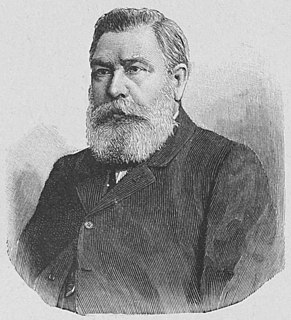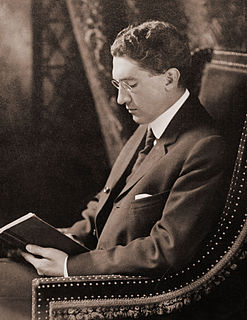A Quote by Heinrich von Treitschke
War is elevating, because the individual disappears before the great conception of the state... What a perversion of morality to wish to abolish heroism among men!
Quote Topics
Related Quotes
There is the great, silent, continuous struggle: the struggle between the State and the Individual; between the State which demands and the individual who attempts to evade such demands. Because the individual, left to himself, unless he be a saint or hero, always refuses to pay taxes, obey laws, or go to war.
The cause of the great War of the Rebellion against the United States will have to be attributed to slavery. For some years before the war began it was a trite saying among some politicians that "A state half slave and half free cannot exist." All must become slave or all free, or the state will go down. I took no part myself in any such view of the case at the time, but since the war is over, reviewing the whole question, I have come to the conclusion that the saying is quite true.
Religion must be used in furthering great works of justice and reform. It must be used to establish right relations between different groups of men, and thus to make a reality of brotherhood. It must be used to abolish poverty, the breeding ground of all misery and crime, by distributing equably among men the abundance of the soil. And it must be used to get rid of war and to establish enduring peace. Here is the supreme test of the effectiveness of religion.
You point out that war is only a symptom of the whole horrid business of human behavior, and cannot be isolated. And that, even if we abolish war, we shall not abolish hate and greed. So might it have been argued about slave emancipation, that slavery was but one aspect of human disgustingness, and that to abolish it would not end the barbarity that causes it. But did the abolitionists therefore waste their breath? And do we waste ours now in protesting against war?
The form of government that is most suitable to the artist is no government at all. ... One might point out how the Renaissance was great, because it sought to solve no social problem, and busied itself not about such things, but suffered the individual to develop freely, beautifully, and naturally, and so had great and individual artists, and great, individual men. One might point out how Louis XIV, by creating the modern state, destroyed the individualism of the artist.
The whole conception of a God is a conception derived from the ancient oriental despotisms. It is a conception quite unworthy of free men. We ought to stand up and look the world frankly in the face. We ought to make the best we can of the world, and if it is not so good as we wish, after all it will still be better than what these others have made of it in all these ages.
For as long as men and women have talked about war, they have talked about it in terms of right and wrong. And for almost as long, some among them have derided such talk, called it a charade, insisted that war lies beyond (or beneath) moral judgment. War is a world apart, where life itself is at stake, where human nature is reduced to its elemental forms, where self-interest and necessity prevail. Here men and women do what they must to save themselves and their communities, and morality and law have no place. Inter arma silent leges: in time of war the law is silent.
Many men without morals have attacked religion because it was contrary to their inclinations. Many wise men have despised it because it seemed to them ridiculous. Many persons have regarded it with indifference, because they have never felt its true disadvantages. But it is as a citizen that I attack it, because it seems to me harmful to the happiness of the state, hostile to the march of the mind of man, and contrary to sound morality, from which the interests of state policy can never be separated.
The superstition respecting power and office is going to the ground. The stream of human affairs flows its own way, and is very little affected by the activity of legislators. What great masses of men wish done, will be done; and they do not wish it for a freak, but because it is their state and natural end.
To have security against atomic bombs and against the other biological weapons, we have to prevent war, for if we cannot prevent war every nation will use every means that is at their disposal; and in spite of all promises they make, they will do it. At the same time, so long as war is not prevented, all the governments of the nations have to prepare for war, and if you have to prepare for war, then you are in a state where you cannot abolish war.






































